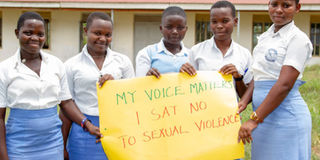Activists want youth to get reproductive services

Students of Nankadula SSS Kyankwanzi join a campaign against sexual violence on March 4. PHOTO/FILE
BY FRED MUZAALE
Health rights activists have asked government and other stakeholders to create a strategy that addresses sexual and reproductive health rights of the youth amid the Covid-19 pandemic.
The activists under Action for Rural Women’s Empowerment (Aruwe) say the pandemic has restricted youth from accessing and utilising sexual reproductive health services.
The NGO, which operates in Wakiso, Kyankwanzi, Kiboga, Sembabule and Nebbi districts, notes that the high transport fares have restricted youth from accessing health facilities.
Curfew hours have also limited the time within which services can be accessed, and health facilities can only serve a few people at a go to ensure social distancing. Curfew starts from 9pm to 5:30am.
“All actors have to care about the provision of quality, affordable and accessible sexual reproductive health services (SRHS) for, especially young people, who before the pandemic faced several other barriers to using sexual and reproductive services,” Ms Edith Tendo, a programme officer at Aruwe, told Daily Monitor at the weekend.
They also noted the rampant cases of pregnancy among school girls since March when government ordered the closure of education institutions.
“The pandemic has disrupted education, and the outcomes so far are worse for girls than boys. Gender-based violence has predominantly affected girls and women in droves. The chances of girls going back to school have drastically reduced, and in the long run, their social, economic and political participation is compromised,” Ms Tendo said.
Police statistics indicate that 4,442 cases of defilement were reported between January and April countrywide.
Ms Brenda Namulembwa, a programme officer at Aruwe, said cases of schoolgirls getting married and having unplanned pregnancies have become rampant , especially in rural communities.
A report by the United Nations Population Fund on teenage pregnancies in Uganda during and post Covid-19 lockdown indicated that eastern region recorded the highest reported cases of early pregnancies, with Luuka leading with more than 60 cases, followed by West Nile and Ankole regions.
Mr Bosco Mugooda, who is involved in advocating better services for the youth, said government and civil society have diverted resources to the pandemic, leaving gaps in other sectors.
Aruwe observes that while the health systems are being overwhelmed by the Covid-19 cases, they are also being exposed as poorly structured, with inadequate health workers, poor infrastructure and drug stock-outs.
“Sexual reproductive health services have also been considered non-essential with health facilities focusing more on emergency cases. Other modern SRH services have resorted to tele-medicines, which is not easily accessible by young people, especially in rural communities,” Ms Namulembwa said.
“They have been very fast to respond, including working with donors/partners to realign their planned activities and budgets to support young people in need of SRH services. They have also provided substantial support to young people and contributed to altering SRHR abuse and violation,” she added.
The government has developed a number of policies that address some of these SRHR concerns.
They include the National Adolescent Health Policy, the National Framework on Sexuality Education and the National School Health Policy.




